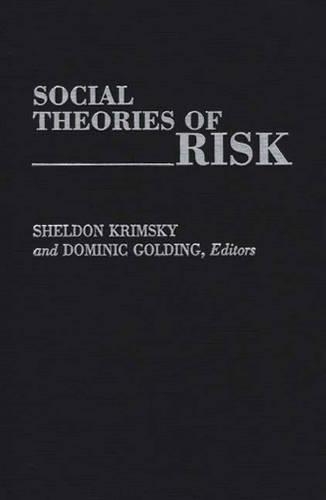
Social Theories of Risk
(Hardback)
Available Formats
Publishing Details
Social Theories of Risk
By (Author) Sheldon Krimsky
Edited by Dominic Golding
Bloomsbury Publishing PLC
Praeger Publishers Inc
30th August 1992
United States
Classifications
Tertiary Education
Non Fiction
History of ideas
306
Physical Properties
Hardback
432
Width 156mm, Height 235mm
822g
Description
The social science approach to risk has matured over the past two decades, with distinct paradigms developing in disciplines such as anthropology, economics, geography, psychology, and sociology. "Social Theories of Risk" traces the intellectual origins and histories of 12 of the established and emerging paradigms from the perspective of their principal proponents. Each contributor examines the underlying assumptions of his or her paradigm, the foundational issue it seeks to address, and likely future directions of research. Taken together, these essays illustrate that the principal achievement of social sciences has been to broaden the debate about risk beyond the narrow, technical considerations of engineers and the physical and life sciences. The authors conclude that expert knowledge is not value-free, that public perceptions of and attitudes toward risks vary according to a wide range of social, psychological, and cultural variables, and that public opposition to particular risks cannot be assuaged by technical fixes. The essays reveal the circuitous paths that lead people to the study of risk, highlight how these paths have crossed and discuss some of the seminal influences on individuals and the field in general. "Social Theories of Risk" presents a broad, retrospective view of the state of the theory in the social sciences, written by many who have been at the leading edge of risk research since its early days. The book includes both established and novel perspectives that address the theoretical foundations of the field and reflect what we know about risk as a psychological, social, and cultural phenomenon. The collection of papers not only informs us of the tributary ideas that spawned the social studies of risk, but also how the field has matured. The biographical flavour of the essays should provides fascinating reading for established members of the field, and a valuable entree for newcomers. It is a suitable college text for courses in the history of science, as well as for the increasing array of more specialised courses in risk assessment and management.
Reviews
"This is an excellent introduction to the state of the art in why people identify something as a threat . . . more comprehensive than any predecessor. . ."-Risk Abstracts
"It is a rare book that I pick up and read from cover to cover without loosing interest, and I am pleased to say that Krimsky's and Golding's Social Theories of Risk is among those. This is a unique collection of essays, written in a lucid jargon-free prose and folded together into a coherent whole. Social Theories of Risk should be a required text for graduate students in environmental sciences, engineering, and public health. It should also be read by risk managers who are struggling to simultaneously interpret the science, and to respond to the pressing and legitimate needs of the society."-Halina S. Brown Associate Professor of ETS and Chairperson Clark University
"Krimsky and Golding provide a fresh and illuminating perspective on the variety of theories and paradigms that together comprise current social studies of risk. The range over disciplines and national origins is broad and provocative."- Gilbert F. White Natural Hazards Research and Applications Information Center University of Colorado, Boulder
This is an excellent introduction to the state of the art in why people identify something as a threat . . . more comprehensive than any predecessor. . .-Risk Abstracts
Author Bio
SHELDON KRIMSKY is Professor of Urban and Environmental Policy at Tufts University. He has published widely on the social and ethical impacts of technology. His books include Biotechnics and Society: The Rise of Industrial Genetics (Praeger, 1991, Environmental Hazards: Communicating Risks as Social Process (Auburn House, 1988) and Genetic Alchemy: The Social History of the Recombitant DNA Controversy. DOMINIC GOLDING is a Fellow at the Center for Risk Management, Resources for the Future. He is the author of The Different Susceptibility of Workers to Occupational Hazards and contributed to The State of the Earth Atlas.
